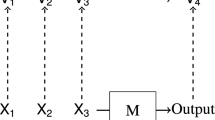Abstract
While logical theories of information attitudes, such as knowledge, certainty and belief, have flourished in the past two decades, formalization of other facets of rational behavior have lagged behind significantly. One intriguing line of research concerns the concept of intention. I will discuss one approach to tackling the notion within a logical framework, based on a database perspective.
Similar content being viewed by others
References
Alchourrón, C. E., Gärdenfors, P., & Makinson, D. (1985). On the logic of theory change: Partial meet contractions and revision functions. Journal of Symbolic Logic, 50(2), 510–530.
Bratman, M. (1987). Intention, plans and practical reason. Cambridge: Harvard University Press.
Bratman, M. (2009). Intention, belief, practical, theoretical. In J. Timmerman, J. Skorupski, & S. Robertson (Eds.), Spheres of reason. Oxford: Oxford University Press.
Cohen, P. R., & Levesque, H. (1990). Intention is choice with committment. Artificial Intelligence, 42(3), 213–261.
de Kleer, J. (1986). An assumption-based TMS. Artificial Intelligence, 28(2), 127–162.
Dean, T., & McDermott, D. V. (1987). Temporal data base management. Artificial Intelligence, 32(1), 1–55.
Doyle, J., & Wellman, M. P. (1994). Representing preferences as ceteris paribus comparatives. In Proceedings of the AAAI spring symposium on decision-theoretic planning (pp. 69–75).
Fagin, R., Halpern, J., Moses, Y., & Vardi, M. (1994). Reasoning about knowledge. Cambridge: MIT.
Friedman, N., & Halpern, J. Y. (1999). Modelling beliefs in dynamic systems. Part II: Revision and update. Journal of Artificial Intelligence Research, 10, 117–167.
Gabbay, D. (1996). Labelled deductive systems. Oxford: Clarendon.
Gettier, E. L. (1963). Is justified true belief knowledge? Analysis, 23, 121–123.
Harel, D., Kozen, D., & Tiuryn, J. (2000). Dynamic logic. Cambridge: MIT.
Harman, G. (1986). Change in view. Cambridge: MIT.
Harman, G. (1999). Practical reasoning. In Reasoning, meaning and mind (pp. 46–74). Oxford: Oxford University Press.
Herzig, A., & Longin, D. (2004). C&l intention revisited. In Proc. KR2004.
Horty, J. F., & Pollack, M. E. (2001). Evaluating new options in the context of existing plans. Artificial Intelligence, 127(2), 199–220.
Icard, T., Pacuit, E., & Shoham, Y. (2009). A dynamic logic of belief and intention, (Forthcoming).
Kripke, S. A. (1980). Naming and necessity (revised and enlarged edition). Oxford: Blackwell.
Lamarre, P., & Shoham, Y. (1994). Knowledge, certainty, belief, and conditionalisation (abbreviated version). In Proceedings of KR (pp. 415–424).
McCarthy, J. M., & Hayes, P. J. (1969). Some philosophical problems from the standpoint of artificial intelligence. Machine Intelligence, 4, 463–502.
McDermott, D. (1982). A temporal logic for reasoning about processes and plans. Cognitive Science, 6(2), 101–155.
McDermott, D. V. (1983). Contexts and data dependencies: A synthesis. IEEE Transactions on Pattern Analysis and Machine Intelligence, 5, 237–246.
Peppas, P. (2007). Belief revision. In F. van Harmelen, V. Lifschitz, & B. Porter (Eds.), Handbook of knowledge representation. Amsterdam: Elsevier.
Rao, A. S., & Georgeff, M. P. (1991). Modeling rational agents within a BDI-architecture. In Proceedings of the third conference on knowledge representation and reasoning. Morgan Kaufmann.
Robinson, P. H., & Dubber, M. D. (2007). The American model penal code: A brief overview. New Criminal Law Review, 10(3), 319–341.
Rott, H. (2001). Change, choice and inference: A study of belief revision and nonmonotonic reasoning. Oxford logic guides. Oxford: Oxford University Press.
Roy, O. (2008). Thinking before acting: Intentions, logic, rational choice. PhD thesis, Institute for Logic, Language and Computation, University of Amsterdam.
Roy, O. (2009). Intentions and interactive transformations of decision problems. Synthese, 169(2), 335–349.
Sandewall, E. J., & Shoham, Y. (1994). Nonmonotonic temporal reasoning. In D. Gabbai (Ed.), Handbook of logic in artificial intelligence and logic programming. Amsterdam: Elsevier.
Shoham, Y. (1993). Agent oriented programming. Journal of Artificial I ntelligence, 60(1), 51–92.
van Benthem, J. (1997). Exploring logical dynamics. CSLI, Stanford University.
van Benthem, J., Girard, P., & Roy, O. (2008). Everything else being equal: A modal logic for ceteris paribus preferences. Journal of Philosophical Logic, 38(1), 83–125.
van der Hoek, W., Jamroga, W., & Wooldridge, M. (2007). Towards a theory of intention revision. Synthese, 155(2), 265–290.
van der Hoek, W., & Wooldridge, M. (2003). Towards a logic of rational agency. Logic Journal of the IGPL, 11(2), 135–160.
van Ditmarsch, H., van der Hoek, W., Kooi, B. (2007). Dynamic epistemic logic. New York: Springer.
Velleman, J. D. (2008). What good is a will? In A. Leist, & H. Baumann (Eds.), Action in context. Berlin: de Gruyter/Mouton.
Voorbrak, F. (1990). Generalized Kripke models for epistemic logic. In Proceedings conference on theoretical aspects of reasoning about knowledge (pp. 214–228). San Francisco: Morgan Kaufmann.
Wallace, R. J. (2006). Normativity and the will. Oxford: Oxford University Press.
Weld, D. S. (1999). Recent advances in AI planning. AI Magazine, 20, 93–123.
Yaffe, G. (2004). Trying, intending, and attempted crimes. Philosophical Topics, 32(1–2).
Author information
Authors and Affiliations
Corresponding author
Additional information
I first met Johan van Benthem when I was a graduate student working on temporal logic, and Johan the world authority on the topic. His gracious and thoughtful response to my writing impressed and gratified me. I still keep his first, impeccably hand-written letter to me. I have had the pleasure of interacting with Johan over the years, including, in recent years, co-teaching with him a course at Stanford on Logic and Rational Agency. The present article is relevant to the subject matter of that course, and it is a pleasure to contribute it to this special issue in his honor.
Rights and permissions
About this article
Cite this article
Shoham, Y. Logical Theories of Intention and the Database Perspective. J Philos Logic 38, 633–647 (2009). https://doi.org/10.1007/s10992-009-9116-8
Received:
Accepted:
Published:
Issue Date:
DOI: https://doi.org/10.1007/s10992-009-9116-8



